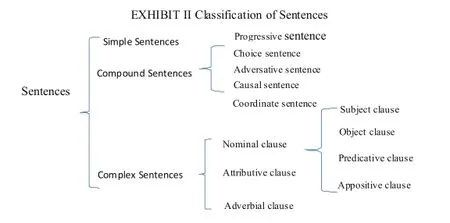Expound the Importance of Basic Sentences
2016-11-22李戍武覃颍马进黄超叶
文/李戍武 覃颍 马进 黄超叶
Expound the Importance of Basic Sentences
文/李戍武 覃颍 马进 黄超叶
Based on investigation on English learners from high school students to university students, It is very hard for them to write an accurate sentences. Even some of English high-score learners say they write English sentences by language sense. They can not tell you why it is right or wrong. From this thesis, the author takes basic typical clauses for examples to let English learners compose authentic sentences by English rules.
Theories for basic typical clauses
A book written by Bo bin sorts basic typical clauses by seven types: SV, SVA, SVO, SVOA, SVC, SVoO, SVOC ( Bo, Bin, 2001: p522). Zhang Zhengbang also divides basic typical clauses into seven categories : SV, SVA, SVO, SVOA, SVC, SVoO, SVOC (Zhang, Zhenbang, 2009:p18). See Exhibit I Basic Typical Clauses
EXHIBIT I Basic Typical Clauses
1.S + V
E.g. Iron rusts.
2.S+V+O
E.g. I want a return ticket.
3.S+V+C
E.g. That car is new.
4.S+V+o+O
E.g. I sent him a telegram.
5.S+V+O+C
E.g. We made him our spokesman.
6.S+V+A
E.g. I live in Beijing.
7.S+V+O+A
E.g. She speaks English fluently.
They two only show the readers what “S”, “V”,”O”, “C” and “A”are. As a result, Lots of English teachers teach students only the face value of basic sentences according to current hot grammar books. The author with several year experience of learning and teaching English has discovered English learners understand basic sentences well. The rate of writing right sentences is higher than that by language sense.
The link between sentences
Sentences are divided into basic sentences, compound sentences and complex sentences. See Exhibit II:

Compound and complex sentences include basic sentences. We can defines basic sentences as the root of them. Some sentences are chosen as examples.
Groups for compound sentences
1.H e had plenty of money (SVO) and he spent it freely(SVOA). (progressive sentence)
2.Either you are right (SVC), or I am (SVC). (choice sentence)
3.He likes pop music (SVO), while I am fond of folk music (SVC). (adversative sentence)
Groups for complex sentences
1.She is the girl who lives next door (main:SVC/subordinate:SV). (attributive clause)
2. What he said is right (main:SVO/ subordinate:SVC). (subjective clause)
3. I cant imagine how he did it ( main:SVO/subordinate:SVO). ( objective clause)
From the examples of compound and complex sentences, we can find the rule that firstly each sentence adds some linking words ( and, or, while, who, what, how), then basic sentences (from 1 to7) occur again. In conclusion, compound and complex sentences can be composed by such formula I:
One basic sentence + linking words + another basic sentence
E.g. 1.She is the girl (S+V+C) +who (linking word)+ lives next door. ( S+V)
2.He had plenty of money (SVO) +and (linking word)+ (he spent it freely(SVO)
The rules for extensive basic sentences
To extend basic sentences should follow these rules below:
a. I goon Sunday. (S+Vi+Preposition+O1)
b. Igotoplay football. (S+Vi+Infinitive “to”+Vt+O1)
c. I go Sunday. (S+V)
d.I write a letter into your dream. (S+Vt+O1+Preposition+O2)
f. I run fast into a very dirty room. (S+Vi+Preposition+O1)
From the five sentences above, We can take a note as followed:
Basic sentences (S+Vi and S+Vt+O) could have extensive parts (O1,O2 and to), but it should follow the rules:
- Preposition pluses O (see a,d and f examples above)
-Two verbs should insert“to” (see b) between them.
- Adjectives qualify Noun (see d and f)
- Adverbs qualify verbs or adjectives (see c and f)
From the explanation above, let’s illustrate a S+V sentence:
A girl (S) runs (Vi)
I. A beautiful girl runs.
II. A beautiful girl runs fast.
III. A beautiful girl runs fast into a room.
IV. A beautiful girl runs fast into a dirty room.
V. A beautiful girl runs fast into a very dirty room.
A supplement to construction of basic sentences
When we take the above methods to make a sentence, we still need to think twice. Let’s have a look at Exhibit III below:
EXBIHIT III Connection between Thoughts and A Culture

From the Exhibit II, we know the thoughts can become behaviors, then end up a culture. Conversely a culture can impress the thoughts. West people’s way of thinking is a line. A line hints simpleness and logic. So the sentences in English should be simple and logic. Examples are as followed:
Right: I go to school to see my teacher.
Wrong: I go to school to see my teacher to brush the blackboard to
drink a cup of tea. (Logic is confused)
Right: She is a beautiful girl.
Wrong: She is a girl who is beautiful. (complex)
From the examples above, the sentences over, we still should evaluate whether it complies with the rule, simpleness and logic.
Conclusion
Either an English learner is a rookie or veteran. The basic sentences and rules for extension sentences understood, you write a right sentence easier than before. The basic sentences are the root of compound and complex sentences.
Bibliography
[1] Bo Bin:An Advanced English Grammar. Beijing: World Affairs Press 2001.
[2] Zhang Zhengbang: A New-English Grammar Coursebook. Shanghai: Shanghai Foreign Language Education Press 2009.
李戍武(19 82-),男,壮族,广西来宾象州人, 硕士研究生,广西科技师范学院教务处教师,研究方向:英语语法研究;覃颍(1988-),女,广西柳州人,硕士研究生,广西科技师范学院教务处教师,研究方向:大学生教学课程研究;马进(1985-),男,广西南宁人,硕士研究生,广西职业技术学院教务科研处教师,研究方向:大学生教学课程研究;黄超叶(1982-),男,壮族,广西柳州人, 2014级硕士研究生,广西科技大学鹿山学院教务处教师,研究方向:大学生教学课程研究。)
Basic Typical Clauses, English Rules
